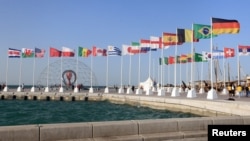Soccer fans from Taiwan will no longer be confused when attempting to apply for a pass to watch the World Cup in Qatar after the host country added Taiwan to its dropdown menu. The Middle Eastern country made the change in response to Taiwan’s protests, the government-run Central News Agency in Taiwan reported.
Taiwanese officials had lodged a protest to the Fédération Internationale de Football Association (FIFA) earlier this week over rules requiring their citizens to register as Chinese before attending the 2022 World Cup.
The Taiwan-based Chinese Taipei Football Association sent FIFA a letter after a citizen posted online Monday that he could not qualify for a World Cup attendance pass unless he picked "China" as his nationality and listed a China-based phone number, Chiao Chia-hung, association deputy secretary-general, told VOA. The pass would serve as a visa to the venues in Qatar.
FIFA replied that it's checking into the case, Chiao said.
Taiwan and China have been at odds politically for 80 years. China claims self-ruled Taiwan as part of its territory, and officials in Beijing ask foreign organizations — from pageants and parades through the United Nations — to cast Taiwan as part of China or deny it participation. Organizers and their host countries often obey to avoid any trade or investment reprisals from Beijing, which has the world's second-largest economy.
Without a Taiwanese nationality or a Taiwanese contact number for World Cup on the application, fans are at risk of not finding out if they'll get their passes once they've applied, Chiao said. Not everyone who applies now will be allowed to attend, he said. The November 21-December 18 event this year has 32 teams and is expected to take place across eight stadiums.
"We sent FIFA an email yesterday to say we had noted this case and said we hoped they could understand and assist as well as make a correction," he said. "Fans' rights and their ability to be notified accurately, that's very key."
Taiwan's Ministry of Foreign Affairs also contacted a Qatari organizing body for the World Cup to demand a change in the rules, according to an emailed statement. "The Foreign Ministry has no way of accepting this belittlement of our side," the statement says.
The Foreign Ministry in Qatar did not reply to a request for comment.
Increasing numbers of Taiwanese are soccer fans, despite historic preferences for baseball and basketball, Chiao said. He said about 3,000 Taiwanese attended the 2018 World Cup in Russia.
In 2019, China pressed a list of multinational firms, including airlines, to relabel Taiwan on their public dropdown menus. The FIFA flap is a similar case, analysts say.
The World Cup barrier will elevate Taiwanese anger toward China and make people outside China feel sympathy toward Taiwan, said Sean Su, an independent political analyst in Taiwan.
"I understand why Qatar and other nations may feel that they want to kowtow to China or do this for China," he said. "For them, it makes it easier to deal with China, but for the rest of the world, it just brings more sympathy to Taiwan."
China's global reputation
China has said it resents third countries, multinationals and international bodies for implying that Taiwan is not Chinese territory.
Chinese officials are using the World Cup to push back against Taiwan's informal supporter, the United States, said Liu Yih-jiun, a professor at Fo Guang University in Taiwan. The United States, a former Cold War foe of Beijing, sells arms to Taiwan and exchanges high-level visits.
"I think at this moment, mainland China tries to play kind of a hawkish posture, and they don't want to mislead the United States, [that the] United States has any room at all to further politically maneuver," Liu said.
Taiwanese people have gotten used to China's pressure at international events, Liu said. They are like a frog in a slowly boiling pot, and China feels the "water isn't hot enough yet."
The China-Taiwan rift emerged when Chiang Kai-shek's Nationalists lost to Mao Zedong's Communists in the Chinese civil war of the 1940s and rebased their government in Taipei.
Beijing says it will use force, if needed, to unite the two sides. Since mid-2020 it has flown military planes over part of Taiwan's air defense identification zone almost daily.
The will of Taiwan residents is still uncertain due to varied outcomes of different surveys. Most Taiwanese told a survey by the Taiwanese Public Opinion Foundation last year that they oppose unification with China. A different poll last year by the National Chengchi University found the majority of the respondents prefer to keep the status quo and decide on reunification or independence later.





